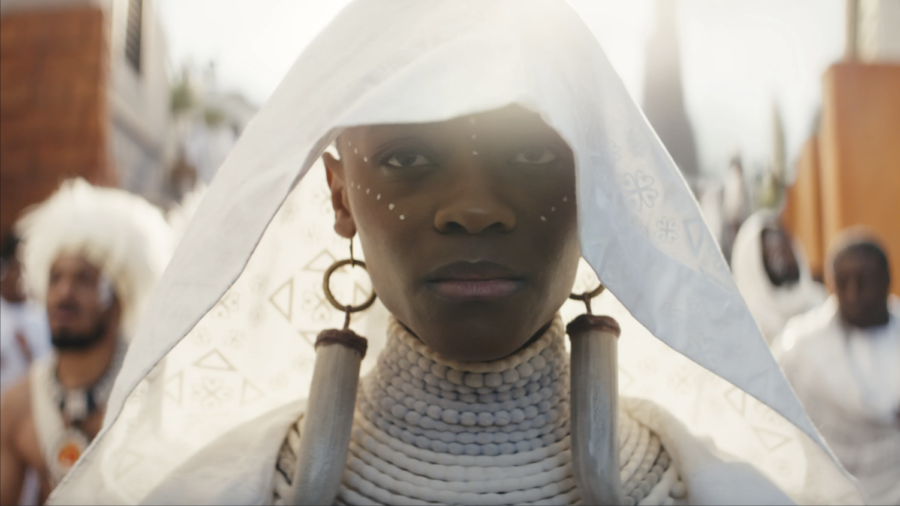Your donation will support the student journalists of The Tide, Richard Montgomery High School's student newspaper. Your contribution will allow us to purchase equipment and cover our annual website hosting costs.
How to not live up to standards: ‘Wakanda Forever’
January 12, 2023
Shuri, the new hero of the Black Panther series, walks in T’Challa’s funeral procession.
Four years have passed since actor Chadwick Boseman donned a sleek black costume as the iconic namesake of Marvel’s “Black Panther.” During this period, Boseman passed, and the world was shocked by change after change; four years felt like an eternity. Anticipation was at an all-time high for the film’s sequel, “Black Panther: Wakanda Forever,” when it was released on Nov. 11, and while fans flocked to the theaters in record numbers, the production accrued over $180 million in its first week, ending one of the worst box office droughts in history.
While opinions of “Wakanda Forever” are mixed, one general consensus is made evident by countless online reviews and student scrutiny: it doesn’t beat the original. While the sequel has received a respectable Rotten Tomatoes rating of 84 percent after its first month in theaters, this is still a letdown in comparison to its predecessor’s “certified fresh” 96 percent.
At its basis, “Wakanda Forever” follows “Black Panther,” a superhero movie. Was this sequel a good superhero movie? Not in the slightest.
During the opening moments of the film, Marvel masterfully circumvents the issue of Boseman’s absence in the plot by explaining that his character, T’Challa, succumbed to a disease discovered too late.
However, this one point becomes repeated constantly, which is where the grievances begin. I expected an important nod to Boseman’s work, then a build-up on it to expand the face of the Black Panther franchise. What we received instead was a two hour and 45 minute movie attributed to him not being there. Why is this an issue?
First, an elegy is not typical of what one would expect in an action-packed blockbuster. And while the movie is certainly action-packed, the thought of “What if T’Challa was here?” is iterated time and time again, especially from the new hero, Shuri (Letitia Wright). This sentiment echoes throughout RM. “Moving on is something the characters just did not do,” sophomore Nathan D’Cruze said.
The hard truth is that people do not flock to the superhero genre in order to explore loss and solace —they come for war and adrenaline-fueled fighting, whether nuanced or not. This is true for Black Panther in particular, as it became an icon of the industry because of this same nuance and elite action.
By limiting itself to this success formula in the past, Marvel has raised the bar for its fanbase, but its divergence from this route has created controversy. “The MCU’s mechanics are too oppressive to allow for true mournful meditation,” Adam Kempenaar from Rotten Tomatoes said. This presents a negative on both ends of the spectrum, making the hypothetical quality of “Wakanda Forever” low to begin with.
Furthermore, the focus on T’Challa’s absence destroys Shuri and her prospects as the current Black Panther. Rather than emphasizing her uniqueness as a female hero and queen—one who is less of a raw fighter and more of a scientist, no less—Marvel dials in on her emotions for her brother. While this is great, its overuse does take away valuable screen-time and character building for Shuri, who I just couldn’t get myself to look up to in the same way as T’Challa afterward.
Many students seemed to echo this sentiment. “This might be harsh, but I still just see her as the little sister to the actual Black Panther,” sophomore Norman Meyer said. “Personally, she feels the same as a side character from the last movie.”
Despite this flawed execution of loss, the movie possesses some redeeming qualities. The mermaid-like Talokan tribe, despite being a 180 in terms of backstory, has an interesting lifestyle and makes complete sense in the grand scheme of things. Furthermore, Tenoch Huerta as Namor is a likable, justified antagonist with something to protect, glazing the battles between Talokan and Wakanda with a shadow of doubt—doubt that contrasts his cruel means of disposing of humans. Queen Ramonda (Angela Bassett), mother of Shuri and T’Challa, provides strength and stability for the whole country. Her continuous sacrifices require Shuri to step up to a whole new level, especially after a fan-favorite meeting that brings back Killmonger (Michael B. Jordan) in the spirit world.
While artistically crafted with many solid elements, “Black Panther: Wakanda Forever” does not live up to its name as a Marvel feature film. Though this can partially be attributed to the tragic and convoluted situation of its production, the goal it aims to achieve is not synonymous with what Marvel, nor the “Black Panther” franchise, established in the past. In the words of freshman Matthew Hefferon, “The movie just wasn’t cool.” Fans expected an action-packed film, but received a mourning movie instead.
